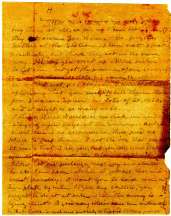Letter to Emmet Brooks
Summary:
Andrew Brooks assesses the profitability of selling
skillets and mentions the court martials of several soldiers in
his regiment.
February 20th 1863
Camp Winder[1]
Dear Emmet,
Your letter was
received yesterday evening.
I had mailed one to you in the
morning. I have had very little
opportunity to make the inquiries you
wish. I have been on road detail
today (making corduroy road to
Guinney's[2])
and have to go again tomorrow, so you see it will be
impossible to go to Guinney Station
before Monday, if indeed I can go then.
I suppose you were led to believe, that
large profits could be made on skillets
from having [added: heard] us speak of having to pay
12 or 15 dollars for one. If you could get
that price, it would pay very well, but
I do not think you could get it; unless
you could get them to the different
brigades of the army and sell them there,
in which case, I think they would bring
12 dollars. The sutlers
[3]
of regiments do not
[page 2]
buy them at all, so far as I can hear, unless
they get orders for them. As for the
Sutlers at the Station, I can not speak
positively, but think they act in the same
way. The day you went up, McKee
[4] failed
to get one, but got the promise of one soon, if
he would leave 10 dollars, his name etc, which
he would not do. However I am of the
opinion that you might sell them there
for 8 dollars apiece, in lots of 20, or 30,
and it might be as many as 60.
I think there would be no risk in you
staying a few days, at the Station. But you
know there is no accomodation there, and no
place to keep them. I got the box that night.
It was a treat, I tell you, but you will know that
after the sight of it. The coffee is delicious.
McKee got his furlough next day and started
in about an hour. John D. got his too,
and went Monday. I want you to send me a
tin plate by him. If you buy skillets, you
ought to do it at once while the army is
lying quiet. A good many soldiers have been courtmartialed
in the brigade. Several were publicly whipped today, and
four others [unclear: ].
[added: Haven't heard the sentences of the
Killians[5].]
Andrew
Notes
[1] The Stonewall Brigade constructed Camp Winder for their winter quarters in December of 1862. Located in the forests of Moss Neck, Camp Winder was easily accessible to the Richmond, Fredericksburg and Potomac Railroad and offered good drainage, wood and water supplies (Robertson, The Stonewall Brigade, 175).
[2] Guinney Station was located south of Fredericksburg and was the site of General Stonewall Jackson's death on May 10, 1863 after the battle of Chancellorsville.
[3] John Telford McKee (1845-1912) was a farmer who enlisted in Company I on June 8, 1861. He was captured on March 23, 1862 at Kernstown along with Andrew Brooks. After being exchanged on August 5, 1862, he was promoted to Corporal. McKee was captured during the Battle of Gettysburg and imprisoned at Fort Delaware until February of 1865 when he was exchanged. He died in Buena Vista, Virginia (Robertson, 63). Edward A. Moore, a cannoneer in the Rockbridge Artillery Company, includes an interesting anecdote about McKee's capture at Gettysburg in his memoirs. He relates that the "stalwart Irish Federal" who pulled McKee up over the breastworks said, "Gim-me your hand, Johnny Reb; you've give' us the bulliest fight of the war!" (Moore, 199).
[4] Sutlers were people who followed an army in order to sell provisions to the troops.
[5] Cyrus W. (1842-1906) and George Henry Killian (1840-1888) of Waynesboro, Virginia joined the 5th Virginia Infantry, Company H on March 10, 1862 and April 19, 1861 respectively. George was promoted to Second Lieutenant in April of 1862. Sometime between December 1862 and late January 1863, he went AWOL. He was arrested and sentenced on January 26 to forfeit a month's pay. George was wounded at Chancellorsville (May 3, 1863) and captured at Spotsylvania (May 12, 1864) along with his brother Cyrus. Both were imprisoned at Fort Delaware; George was later transfered to Hilton Head and Morris Island, SC and then Fort Pulaski. The brothers were released in June of 1865. Cyrus went on to become a farmer and merchant in Salem, VA, whereas George eventually moved to Alabama and died of yellow fever in 1888 (Wallace, 136).
Works Cited
Bean, W. G. The Liberty Hall Volunteers: Stonewall's College Boys. Charlottesville: The University of Virginia Press, 1964.
"The Civil War Artillery Page" http://www.lib.uchicago.edu/~cjt1/artillery.html. Chuck Ten Brink. Visited April, 1998
Crenshaw, Ollinger. General Lee's College: The Rise and Growth of Washington and Lee University. NY: Random House, 1969.
Denney, Robert E. The Civil War Years: A Day-by-Day Chronicle of the Life of a Nation. NY: Sterling Publishing Co, Inc., 1992.
Driver, Robert. J. 52nd Virginia Infantry. Lynchburg, Va: H. E. Howard, 1986.
Lankford, Nelson D. "Alexander Robinson Boteler." Encylopedia of the Confederacy. Ed. Richard N. Current. NY: Simon & Schuster, 1993. I: 197-8.
McMurry, Richard. M. "Joseph E. Johnston." Encylopedia of the Confederacy. Ed. Richard N. Current. NY: Simon & Schuster, 1993. II: 859-61.
McPherson, James M. The Atlas of the Civil War. New York: Macmillan, 1994.
Robertson, James. 4th Virginia Infantry. Lynchburg, Va.: H.E. Howard, 1982.
—. The Stonewall Brigade. Baton Rouge: Louisiana State University Press, 1963.
Sublett, Charles W. 57th Virginia Infantry. Lynchburg, Va.: H. E. Howard, 1985.
Turner, Charles W. Old Zeus: Life and Letters (1860-'62) of James J. White (Professor of Greek at Washington College 1852-1893, Captain of the Liberty Hall Volunteers 1861-'62). Verona, VA: McClure Printing Company, Inc., 1983.
Wallace, Lee A. 5th Virginia Infantry. Lynchburg, Va.: H. E. Howard, 1988.

